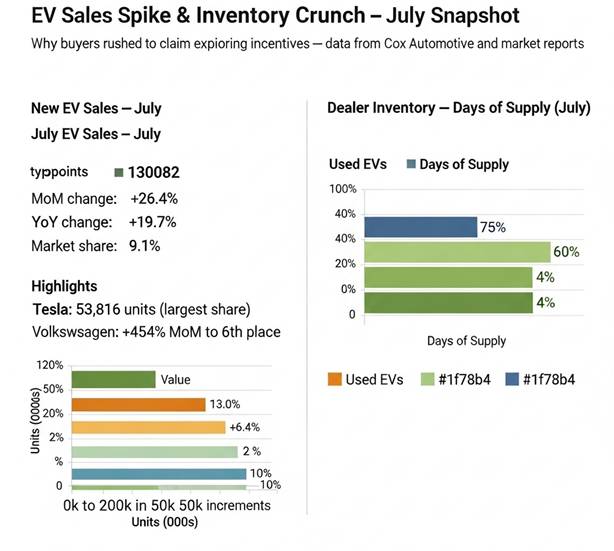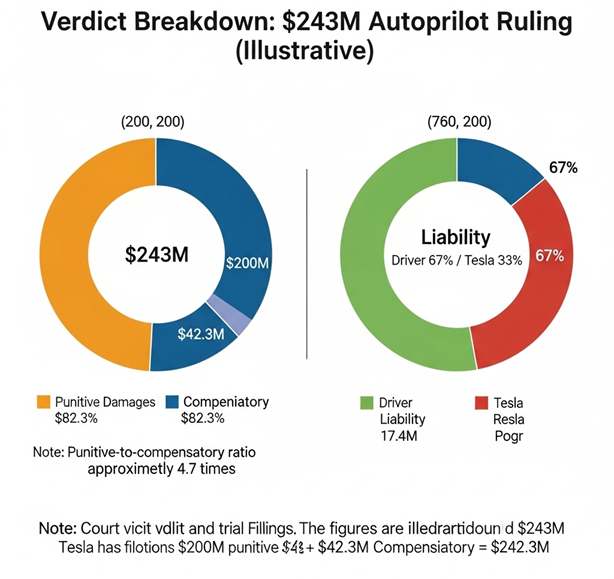Tesla has taken its first major legal step since a Florida jury hit the company with a $243 million verdict tied to a 2019 crash involving Autopilot. In a 71‑page filing, the electric‑car maker asked the court to throw out the verdict, reduce or eliminate the damages, or order a new trial — arguing the case was riddled with legal errors and prejudicial evidence.

This wasn’t a routine auto‑accident suit. It’s the first time a jury has returned a verdict against Tesla in an Autopilot wrongful‑death case; previous claims were settled before trial. The core facts are grim and straightforward: in 2019, a Tesla Model S ran a stop sign at a T‑intersection while the driver picked up a dropped phone. The Tesla struck a parked Chevy Tahoe; debris and the moving Tahoe hit two pedestrians, killing one and critically wounding the other.
At trial the jury assigned fault: the driver was 67% responsible, Tesla 33%. Compensatory damages were awarded, and on top of that the jury slapped Tesla with $200 million in punitive damages — a move that pushed the total to roughly $243 million. The plaintiffs also reached a separate settlement with the driver.
Tesla’s attorneys did not mince words in their request to the court. Their filing advances several lines of argument, grouped under familiar legal themes: the evidence was unreliable, the plaintiffs’ design‑defect and failure‑to‑warn theories were legally deficient, parts of the trial admitted prejudicial evidence, and the punitive‑damage award was grossly excessive. Key points include:
- The company says the expert testimony that supported the verdict was not reliable. If a court agrees, that can undercut the whole liability finding.
- Tesla contends the vehicle wasn’t defective and that the driver’s conduct was the sole proximate cause of the collision.
- The automaker claims any alleged failure to warn didn’t cause the crash, and argues it provided sufficient warnings.
- Tesla objects to the admission of data‑related evidence and public comments — including statements from CEO Elon Musk — saying those items unfairly prejudiced the jury.
- On punitive damages, Tesla leans on Florida law and due‑process limits, arguing the $200 million award is wildly out of proportion to compensatory damages and should be reduced, if not eliminated.
Why the “data” and Musk’s words matter
Two threads in Tesla’s filing are likely to attract attention. First, plaintiffs alleged Tesla withheld important data — an accusation that required outside experts to chase down and interpret recovered information. Tesla says those claims were unfairly used to suggest a cover‑up, prejudicing jurors. Second, the company objects to the use of Musk’s public statements about Autopilot — the same pronouncements that helped build Tesla’s brand. Tesla says such statements were forward‑looking “puffery” that should not factor into legal liability.
That argument is a double‑edged sword. Critics note Tesla often relies on Musk’s public voice as a kind of unpaid marketing engine. So to argue his statements are too speculative to be admissible in court, while arguing at the same time that the cars are “state of the art,” looks inconsistent — and that inconsistency is something plaintiffs’ lawyers will highlight on appeal or at retrial.

There are several realistic outcomes. The judge could:
- Deny Tesla’s motion and let the verdict stand (after which Tesla would almost certainly appeal);
- Grant a new trial if the judge believes certain evidentiary errors were material; or
- Reduce or eliminate punitive damages if the court finds the award violates Florida caps or constitutional limits — a common appellate argument.
Even if the court trims the punitive award, the compensatory portion and the liability finding could remain. Either way, this case is far from over — appeals can take years, and the legal wrangling could reverberate through other Autopilot lawsuits.
Why should regular drivers care? Because this case tests how far manufacturers are responsible for driver‑assist systems and how those systems are marketed. A large punitive award — even if ultimately reduced on appeal — sends a message about corporate accountability. It may make automakers more cautious in their advertising, change how features like Autopilot are labeled, or push companies to beef up data‑handling transparency.
There’s also a reputational hit. The allegation that Tesla withheld data struck a chord: in the court of public opinion, any hint that a company resisted full disclosure in a fatal accident is damaging. For Tesla investors, regulators and buyers, the case could influence confidence and regulatory scrutiny going forward.
It’s worth pausing on the human side. A life was lost, another person gravely injured, and families forever changed. Lawsuits like this mix legal technicalities and raw human tragedy — and courts must balance technical proofs with the reality of those consequences.
Tesla’s motion is dense, technical, and aggressively argued. It’s also predictable: major companies routinely ask judges to overturn large jury verdicts. But the filing does more than press legal buttons; it lays bare tensions that have dogged Tesla for years — about how Autopilot was presented to the public, what warnings were provided, and how data is handled after crashes.
This is a pivotal case. The state trial court now has to weigh procedural claims, evidentiary questions, and statutory limits on damages. The decision will shape the immediate outcome for Tesla, and the appeal process could set broader legal signals about how the courts treat autonomous and semi‑autonomous driving technologies. Watch for the judge’s ruling — and, almost certainly, for an appeal — because the stakes here are high: financial, legal, and moral.
Related Post
